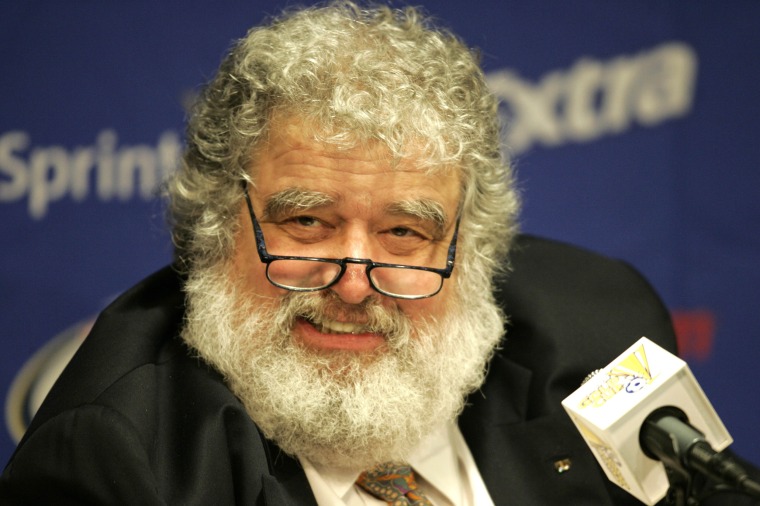The bribery and corruption scandal that toppled FIFA President Sepp Blatter involved the global soccer organization's decisions on who should host at least two World Cups, in addition to millions of dollars' worth of television and marketing contracts, according to federal court documents unsealed Wednesday.
Federal prosecutors last week announced the indictments of nine of the most powerful executives in world soccer, along with four sports marketing executives and an accused intermediary. At the time, they outlined an alleged two-decade conspiracy in which the sports marketing executives paid the FIFA executives more than $150 million in kickbacks and bribes in exchange for rights to televise soccer tournaments.
One of those indicted was Chuck Blazer, an American who was general secretary of the confederation of soccer-playing nations in North and Central America and the Caribbean — CONCACAF, which includes the U.S. — and a powerful member of FIFA's ruling executive committee.
Prosecutors said Blazer pleaded guilty and provided a trove of major evidence in a 2013 plea deal. Until Wednesday, however, details of what Warner actually did and saw remained sealed.
According to a transcript of the 2013 hearing at which Blazer pleaded guilty to 10 counts — including racketeering conspiracy, wire fraud conspiracy, money laundering conspiracy and income tax evasion — Blazer told the court that he personally accepted a bribe for his support in the bidding to host the World Cup in 2010, which went to South Africa, and "facilitated" a bribe to a FIFA colleague in connection with the 1998 World Cup, which was won by France.
Other members of the executive committee also accepted bribes in connection with those World Cups, Blazer told the court.
RELATED: What, and Who, Is Next for FIFA?
Much of what Blazer admitted was revealed last week when the 2013 charges against him were disclosed. But the transcript adds new and important details that give shape to the scope of the scandal. Particularly significant are the maneuverings described around the 2010 World Cup — a scheme that, according to Blazer's plea, involved not only a "high-ranking official with FIFA" but also the South African government.
The schemes started around 1992, as the executive committee began considering bids from Morocco and France to host the 1998 tournament, Blazer said. Blazer and an unnamed co-conspirator traveled to Morocco, where a representative of the Moroccan bid committee offered a bribe to the co-conspirator in exchange for his agreement to cast his secret ballot for Morocco to host the 1998 World Cup, he said.
Morocco tried again in 2004, putting in a bid for the 2010 World Cup. Again, Blazer and the same co-conspirator traveled to Morocco, where a representative of the Moroccan bid committee offered the co-conspirator $1 million for his vote, Blazer said.

Meanwhile, he alleged, FIFA, the South African government and the country's bid committee were arranging for South Africa to pay $10 million to a soccer organization controlled by the co-conspirator, which Blazer said he understood to be a bribe in exchange for Blazer's and the co-conspirator's delivering all of the votes of CONCACAF's representatives to South Africa instead of Morocco.
South Africa won that bid with strong support from the CONCACAF representatives. Eventually, Blazer raked in more than $750,000 from the scheme, he told the court.
Blazer's co-conspirator isn't named, but ahead of the decision for the 2010 tournament, the South African Football Association sent a letter to FIFA asking it to withhold $10 million from the tournament's budget to finance a "Diaspora Legacy Program" under the control of Jack Warner, then president of the U.S. region's confederation, who was among those indicted last week.
At a news conference Wednesday in Johannesburg, South African Sport Minister Fikile Mbalula denied that the $10 million payment was intended as a bribe, instead calling it an "above-the-board" donation to build a soccer center for expatriate Africans living in the Caribbean.
But Mbalula acknowledged that the money went to Warner personally instead of to FIFA or to the regional confederation. He didn't say why beyond praising Warner as "a person of good standing."
The revelations could tarnish the legacies of both World Cups, particularly the 2010 tournament, which is fondly remembered for its images of Nobel Peace Prize winners Nelson Mandela and Archbishop Desmond Tutu smiling and celebrating with the World Cup trophy.
Mandela and Tutu were widely credited with lending prestige that helped put South Africa's bid over the top, and neither has been implicated in any wrongdoing.
